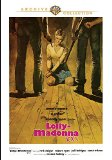| Reviews & Columns |
|
Reviews DVD TV on DVD Blu-ray 4K UHD International DVDs In Theaters Reviews by Studio Video Games Features Collector Series DVDs Easter Egg Database Interviews DVD Talk Radio Feature Articles Columns Anime Talk DVD Savant Horror DVDs The M.O.D. Squad Art House HD Talk Silent DVD
|
DVD Talk Forum |
|
|
| Resources |
|
DVD Price Search Customer Service #'s RCE Info Links |
|
Columns
|
|
|
Lolly-Madonna XXX (Warner Archive Collection)
"By the time I knew what was happening...there wasn't much I could do about it, anyway."
Strange, hypnotic doom and gloom Southern cult classic, with a one-of-a-kind cast. Warner Bros.' Archive Collection has released Lolly-Madonna XXX, the 1973 mountain feud drama from Metro-Goldwyn-Mayer, co-scripted by Sue Grafton (from her novel), directed by Richard C. Sarafian, and starring Rod Steiger, Robert Ryan, Jeff Bridges, Scott Wilson, Season Hubley, Ed Lauter, Randy Quaid, Kiel Martin, Katherine Squire, Tresa Hughes, Gary Busey, Paul Koslo, and Joan Goodfellow. A disastrous title choice, a last-minute edit to tone down the movie's violence (...and it's perhaps unclear which version we're getting here on DVD), and a few well-placed savagings by prominent New York critics doomed Lolly-Madonna XXX to failure and subsequent obscurity. Seen now, it's a remarkably atmospheric take on the inevitable escalation of violence fueled by misunderstood circumstances, primordial urges, and personal weaknesses, shaded by uniformly good performances from the stellar cast. A real find for lovers of 70s moviemaking. An original trailer is included in this very nice anamorphically-enhanced widescreen color transfer.
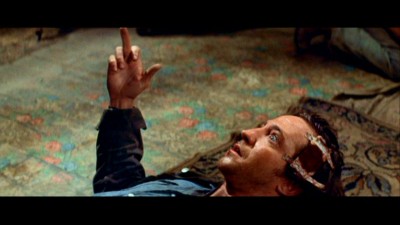
The back mountains of Tennessee, 1972. A peaceful meadow separates two families once joined by love, and now torn apart by hate. A hundred years ago, descendents of the Feather family owned everything the eye could see around the meadow. Now however, the Gustshall family--neighbors to the Feathers for ten years and once good friends--purchased the property two years ago at a back taxes auction, sowing the seeds of distrust and a growing animosity between the Feather clan's patriarch, Laban (Rod Steiger), and the leader of the Gutshall family, Pap (Robert Ryan). Previously, the financially-strapped Laban ordered his sons to steal Pap's hogs; in retaliation, Pap's oldest son, Ludie (Kiel Martin) dreams up a plan--endorsed by Pap--to distract Laban's sons Thrush (Scott Wilson) and Hawk (Ed Lauter) from their moonshine still where the hogs are being penned. Ludie sends a fake postcard he knows the Feather boys will intercept that comes supposedly from Ludie's made-up fiance, "Lolly-Madonna," whom Ludie wrote will be waiting at a deserted bus junction. The ruse works, with the bored, agitated Thrush and Hawk rushing to the junction to see if "Lolly-Madonna" shows up. Meanwhile, Ludie and brother Seb (Gary Busey) raid the still while brother Villum (Paul Koslo) keeps watch, with Ludie losing control and wrecking the Feather still...something his father Pap didn't authorize. When Thrush and Hawk arrive at the lonely bus stop, they spy pretty Roonie Gill (Season Hubley), a newly emancipated foster child whose bad luck it is to be waiting at that particular bus stop, at that particular time. Hawk and Thrush kidnap her and take her back to Laban, who refuses to believe her story; he figures he can exchange her for his meadow land. What follows is a series of misunderstandings and miscalculations on both families' part, as the violence inexorably escalates--between the families and within the families--to unmanageable, deadly levels.
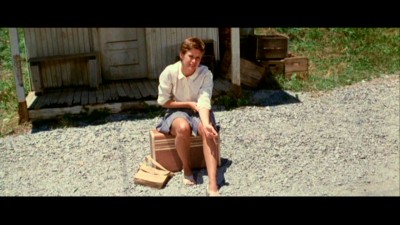
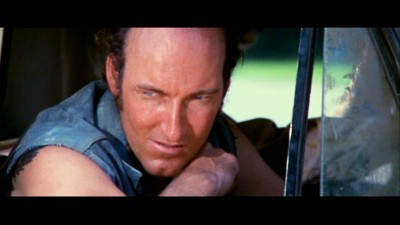
Just a few days ago, I had the pain/pleasure (of course they're the same with really bad movies) of reviewing the excrementitious The Moonshine War, a title I was "discovering for the first time" after having seen an edited, panned-and-scanned copy decades ago as a kid. In that review, which you can read here, I talked about movies from one's distant past that nag unsatisfactorily at the present, and certainly Lolly-Madonna XXX is another dimly-remembered title that has bugged me over the years because of its obscurity (I have very vague, fuzzy jots of seeing it at a drive-in with my older brothers...but quite honestly, I could be remembering just seeing the trailer, such are the brief flashes available to me). I've never read the original 1969 book, The Lolly-Madonna War, by Sue Grafton, which she adapted and co-scripted for the screen (apparently very few people have read it; it was only published in the U.K., in paperback form), so I don't know how much of what I'm seeing on the screen comes from the source material. What part of the script is Grafton's work is up for grabs, too; the screenplay is also credited to Rodney Carr-Smith (he's listed first), who also happens to be the movie's producer...so one might assume his contributions would dominate (I couldn't find anything specific Grafton said about this movie...but her well-known desire to see none of her subsequent Alphabet mysteries turned into Hollywood productions might indicate frustrations with the moviemaking process that started here with Lolly-Madonna XXX...).
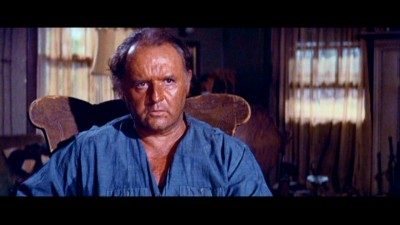
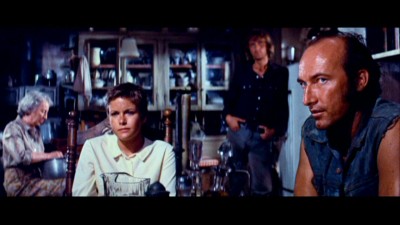
I'm not even sure what Lolly-Madonna XXX I'm watching here. After a little digging, I found out that the movie was screened for some critics with an "R" rating, before it was trimmed by 2 minutes to receive a "PG" rating for its general release; a nude scene was supposedly chopped, along with excessive violence (the AFI catalog gives an initial run time of 105 minutes, and then 103 minutes, which would account for those 2 excised minutes). Several sources indicate that "R"-rated version is the one that raised the ire of snotty, liberal New York critics like Vincent Canby and Rex Reed (they're going to like a hillbilly movie?), and yet...Canby's review references a running time of 103 minutes for the "PG"-rated Lolly-Madonna XXX. This Warner Archive disc is listed at 105 minutes, which sounds like the original run time...but it carries a "PG" rating, and clearly there are obvious edits in this version that indicate cutting away from scenes of violence (such as the rape scene, Ryan showing Steiger the injuries Goodfellow suffered during the rape, and Steiger's gruesome stomping of Wilson). And yet, Season Hubley is, very briefly, nude for a flash here. So...what gives? Having grown up on titles from the 70s, I feel pretty confident that what is present here on this disc would not have received an "R" rating back in 1973. But I also know that M-G-M fiddled with Lolly-Madonna XXX's scattershot release in a vain effort to sell it to the public, including changing its title several times when the "XXXs" made everyone think it was a porno--particularly the newspapers that wouldn't advertise it (boy have times changed...). I've seen ads that listed it as The Lolly Madonna Wars, Lolly Madonna and The Tennessee Feud and Fire in the Meadow, the name slapped on the trailer Warners included here (M-G-M, despite notorious studio head James Aubrey's life-saving economics, was in artistic freefall by 1973, releasing only 15 features for the year--most of them low-budget exploitation outings like Sweet Jesus, Preacherman, Wicked, Wicked, Trader Horn, Deadly China Doll, and The Slams--so it's not surprising Lolly-Madonna XXX received a half-assed release). So the possibility of multiple versions of Lolly-Madonna XXX screened during its brief national and then regional runs is entirely plausible.
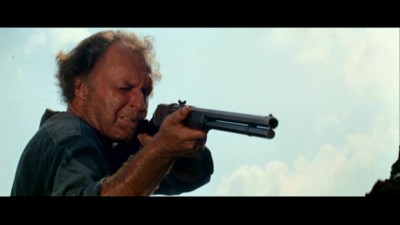
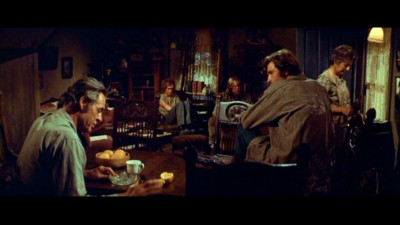
Those other versions aside, what is here, is quite effective. The critics that did bother to see it were mostly split on Lolly-Madonna XXX when it first came out in February, 1973. Those that hated it cried "pointless exploitation," but it's hard to see where they got that from (...unless they saw that harsher "R" edition), since Lolly-Madonna XXX's layered, thematically dense narrative deliberately tamps down any prurient, vicarious pleasures that could arise from its potentially exploitative elements. Opening with a series of black and white snapshots of the neighboring, united Feather and Gutshall families in much happier times, composer Fred Myrow's (A Reflection of Fear, Soylent Green) haunting, mournful music immediately qualifies those seemingly cheerful moments, intimating at the quiet yet terrible pain the families and their members now feel--emotions that will slowly build to a conflagration of tragic, senseless violence. The opening sequence seems to promise just the kind of B drive-in jolts you might expect from a hillbilly actioner: Koslo, Martin, and Busey bait a phony trap for Wilson and Lauter to abandon their 'shine still, while lecherous Wilson and Lauter snatch innocent bystander Hubley from the bus stop. But director Richard C. Sarafian (Vanishing Point, Man in the Wilderness, The Man Who Loved Cat Dancing) deliberately downplays each act: there's nothing "fun" or exciting about Martin smashing the still (voice-of-reason Busey questions why Martin's doing it, which clues us in that unauthorized Martin is going too far), and Hubley, despite that suggestive one-sheet poster artwork and Sarafian's ironic visual build-up (the shots of Lauter leering at her from the truck can only mean one thing, right?), isn't mistreated by anyone during her capture (in fact, she falls in love for the first time). Once we're inside the houses of the two families, the hooting and hollering stops, and we discover the characters in Lolly-Madonna XXX aren't going to be the typical backwoods movie stereotypes we anticipated from that opening sequence (how could we not think that with Sarafian's ironic emphasis on those menacing close-ups of squinty-eyed bastard Lauter?). Instead, they're relatively thoughtful, conflicted, troubled individuals whose inability to communicate and break through their established familial roles ultimately destroys them (the fact that the scriptwriters and Sarafian are able to dimensionalize these sometimes repellent characters, including two rapists, to the point where we feel a measure of pity for their lot, is testament to a movie that's a lot more complicated and challenging than your typical Southern drive-in exploitation number).
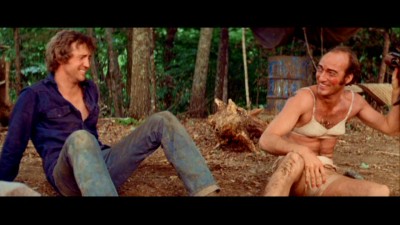
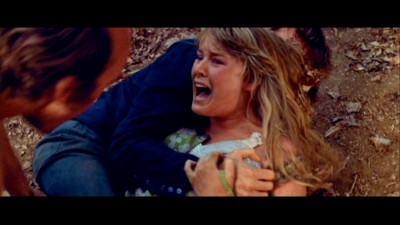
Several critics back in '73 saw parallels to the Vietnam War in Lolly-Madonna XXX, which isn't exactly surprising since most liberal critics back then made a shout-out for the conflict in reference to seemingly any movie that had violence in it. That's too generalized and simplistic an anti-war reach in reconfiguring Lolly-Madonna XXX's dynamics, which more closely explore the frustrations and rage of flawed families and their damaged members, filtered through primal, deadly traditions. Misunderstandings built on perceived slights and "pranks" fuel the bad feelings already present between the neighboring families--and within their own ranks--before ages-old patterns of violence and revenge take hold. In Lolly-Madonna XXX, the core of the Feather and Gutshall feud is a disputed piece of meadowland, but that's just the catalyst for betrayals, big and small, from dirty little tricks like stealing hogs or wrecking stills, to homicidal parental bullying and equally deadly patriarchal indecisiveness. Where the rot truly begins, we learn from Wilson and Lauter, is with Steiger, who apparently had SPOILER ALERT! stronger-than-normal feelings for his son Bridges' wife (Bridges mentions how Steiger and her would go off driving together, or shooting...with a bit of sadness in his voice), culminating in a grief-stricken Steiger killing all of son Wilson's horses, including the one that threw the girl, before settling in to emotionally and physically torture innocent Wilson for this accident. From that point on, as a dying Lauter later tells Hubley, the love went out of the Feather family, and they all went downhill with Steiger. Subsequently losing a piece of their Feather heritage--the meadowland--only deepens Steiger's impotence and rage, with his boys following suit, and Ryan's boys responding in kind (only Ryan's son, Busey, repeatedly asks for peace...and gets his head blown off for his troubles).
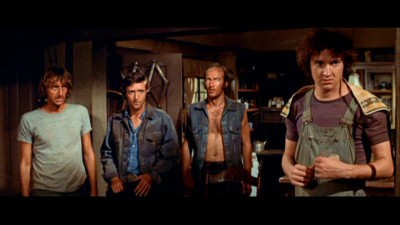
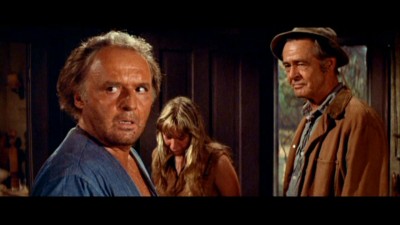
The Gutshall house is no better off for Ryan's supposedly more "reasoned" approach to the feud. Relative newcomers to the area (10 years means "just passing through to the Feathers," states Busey, the movie's most sensible character), the Gutshalls' acquisition of the meadowland looks like it has done nothing to bump them up in either status or wealth, in comparison with the equally down-on-their-heels Feathers. Internal divisiveness apparently stems from a dead son, lost in Vietnam and venerated in the home, where his photo and medals are prominently displayed. Hot-headed son Martin feels the most resentment towards Ryan's worship of this ghost, but ironically, you can see the effects right down through "the ranks," so to speak, from blood-thirsty killer soldier Martin, to delusional wannabe Koslo (always playing at soldier, he cluelessly wraps up eggs and calls them "grenades" for the final deadly assault on the Feather house), to conscientious objector Busey, the lone voice of sanity in the house who constantly consuls calling the law in, or apologizing to the Feathers, while he himself refrains from violence altogether (you could even stretch the analogy to include Joan Goodfellow's Sister E as a civilian collateral damage, raped by the "enemy" Feathers). Giving out a confusing passive-aggressive vibe (Ryan okayed Martin engineering the "Lolly-Madonna" scam, but he doesn't approve of the Feather 'shine still being smashed...but he won't do the decent thing and apologize for it and make it right), Ryan's patriarch is an indecisive, hypocritical family leader who lets everything spiral out of control before he resigns himself to the worst solution possible: violence. And for what? For a stranger? His son Martin is correct: Ryan's "principles" are completely out of whack when he first wants to endanger his family by "rescuing" stranger Hubley (because Ryan feels responsible for her plight), versus sitting around and waiting and "thinking" when Ryan has every right to do what Martin demands--killing those Feather boys responsible for raping his daughter (just listen to Ryan's nonsensical discussion of "principles" and "scruples," before Martin cuts the sh*t and lays it out: "You know what my basic scruple is? Not to get my ass shot off for your basic principles.").
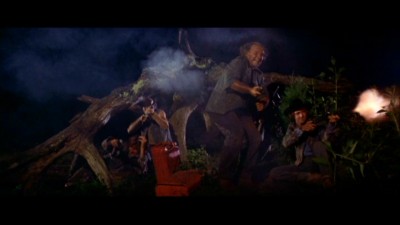
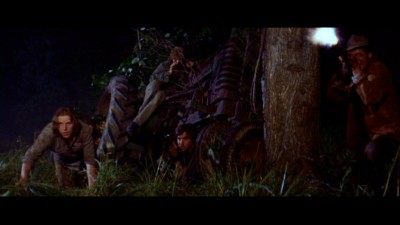
That's some fairly heavy underlayment for what many critics dismissed as a low-minded, violent redneck programmer...though Lolly-Madonna XXX certainly isn't perfect. The editing can be unnecessarily choppy at times (again...who, exactly, did the cutting for this version might help explain...and just like The Moonshine War, you can't discount the chance that M-G-M honcho James Aubrey had a hand in it). Season Hubley's opening narration is nicely downbeat and fatalistic, but it immediately disappears, making us scratch our heads for a half-hour or so, waiting in vain for it to come back. And as much as I loved Ed Lauter's work in the 1970s (one of the premier screen psychos of all time), I'm not sure what to make of Sarafian's emphasis on his character's quirks here; specifically, the "comedic" scene where he pretends to be a backwoods Elvis, complete with an unseen announcer on the soundtrack egging him on, and the disturbing scene, right before he rapes Goodfellow, were he puts on Hubley's underwear and makeup for the amusement of Wilson. These two scenes are frequently mentioned by reviewers as standouts, and they are memorably strange...but they also throw the balance off with the other characters' developments (Kiel Martin has an equally important part here, but his character doesn't have any of these solo "interior" moments like Lauter's...nor does anyone else, except perhaps Bridges' wordless flashbacks to his wife's death). The rape scene is also problematic, directly echoing (and too closely) Peckinpah's Straw Dogs, when Wilson forces himself on Goodfellow, who is shown responding favorably to his advances, before she screams in terror as Wilson holds her down for a make-up smeared Lauter (the scene ends at that moment). What's interesting, though, is how Lolly-Madonna XXX handles the aftermath of this repulsive sequence; a scene of beautifully understated tenderness follows where Goodfellow's pained, non-judgmental mother, Elspeth (Tresa Hughes), soothes a confused Goodfellow, detailing her own initiation to sex (she found it "rude" with new husband Steiger and went home to her mother, before her mother convinced Hughes it was like drinking coffee: an acquired taste), assuring Goodfellow she can "start over again" the next time she falls in love. That's indicative of Lolly-Madonna XXX's complicated aesthetic: alternately brutal and incredibly sensitive.
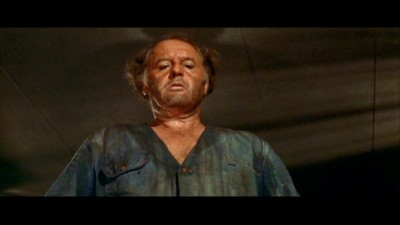
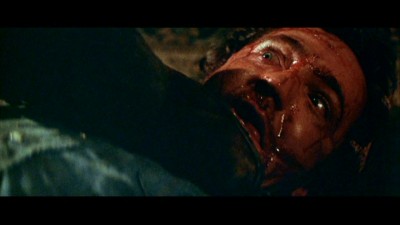
By the time Steiger is roasting Ryan's hogs alive in the disputed meadow, Lolly-Madonna XXX begins to achieve a noteworthy sense of inexorable doom. Loyalties within the families disintegrate, and the bodies start piling up. And finally, you begin to see the spine of what Lolly-Madonna XXX is getting at: these two failed patriarchs, completely different in their approaches to the feud, wind up in the exact same spot--pointless violence that solves nothing. SPOILER ALERTS! Steiger, physically bullying his sons to the point where they become self-destructive animals...but also cowardly enough that he lets his wife Chickie answer Ryan's house call, literally tries to stomp out his own failures by kicking whipping boy Wilson to death, before he loses his mind and is ordered to his room like a child by Bridges (Katherine Squire as Steiger's long-suffering wife, Chickie, has a bravura moment when she quietly tells her son's murderer that he no longer exists to her...one which the script later ironically undercuts when it has her blowing off hostage Busey's head for the death of her son, Skyler...while chicken headcase Steiger makes a sandwich). Ryan, passive and indecisive, refuses to listen to his son Busey's entreaties to call the law, instead relying on son Martin to do the rough stuff while he sits back and contemplates "scruples and principles." Ryan is so removed from how far the situation has deteriorated, that when his wife is shot dead, he bemusedly wonders about the various calamities that are listed on his wife's insurance forms ("How does somebody lose a left foot and the sight of one eye?"). He finally resigns himself to direct violence when his "thinking" comes up short, and the decision achieves nothing. Director Sarafian makes sure the final assault on the Feather home isn't "exciting." We're not encouraged to root for either family, and we get no satisfaction or cathartic rush when people start getting picked off. The final images of Lolly-Madonna XXX--the freeze-frame sepia shots of Steiger and Bridges and Ryan frozen in the middle of the ambush--sure seem like a post-production fiddle for a scene somebody didn't like. However, it does work in the end: it's a completely unsatisfactory resolution for a raw, violent, senseless sequence...and that's just what Lolly-Madonna XXX has been trying to say all along.
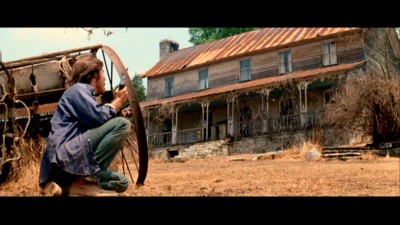
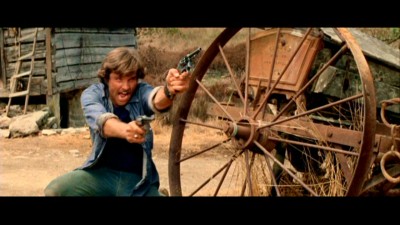
The Video:
The anamorphically-enhanced, 2.35:1 widescreen color transfer for Lolly-Madonna XXX looks great, with those Maynardville, Tennessee locations looking alternately beautiful and sinister: a sharp image with solid detail info; good color, low grain, and few imperfections. Nice.
The Audio:
The Dolby Digital English mono audio track is clean, with a loud re-recording level. No subtitles or closed-captions available.
The Extras:
There's a vintage trailer for Fire in the Meadow, one of the many names that Lolly-Madonna XXX was released under.
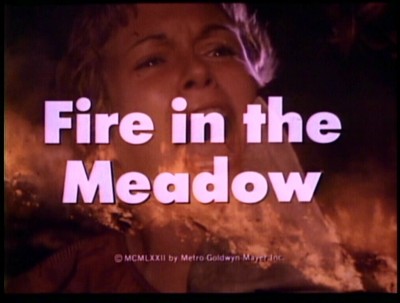
Final Thoughts:
Modern-day Hatfield and McCoy feud, underpinned by a violent, fatalistic melancholy. Director Richard C. Sarafian made a couple of really interesting big-screen efforts inbetween his long television career. I used to think the cult fav Vanishing Point was his highlight (I've got a soft spot for Man in the Wilderness, too), but I'm leaning now towards the hypnotic, languidly brutal Lolly-Madonna XXX. The cast is remarkable: fearless Rod Steiger shows no self-consciousness whatsoever in a truly repugnant role, while Robert Ryan does what he always did best: he sits, and he watches, and he waits (veteran pros Katherine Squire and Tresa Hughes make smaller but equally notable impressions). Then up-and-comers like already-smooth Jeff Bridges, Scott Wilson (in the movie's toughest role), Ed Lauter, Kiel Martin (a pity he didn't have a bigger career), Season Hubley (lovely and sweet), Joan Goodfellow (Buster and Billie!), Gary Busey (a real natural), and Paul Koslo (ditto with Martin) score, too, on what must have been a competitive set. A fascinating look at violence through misunderstanding and primordial traditions, Lolly-Madonna XXX ain't no ordinary hillbilly exploiter...no matter how it was eventually sliced up. I'm highly, highly recommending Lolly-Madonna XXX.
Paul Mavis is an internationally published movie and television historian, a member of the Online Film Critics Society, and the author of The Espionage Filmography.


|
| Popular Reviews |
| Sponsored Links |
|
|
| Sponsored Links |
|
|
| Release List | Reviews | Shop | Newsletter | Forum | DVD Giveaways | Blu-Ray | Advertise |
|
Copyright 2024 DVDTalk.com All Rights Reserved. Legal Info, Privacy Policy, Terms of Use,
Manage Preferences,
Your Privacy Choices | |||||||









